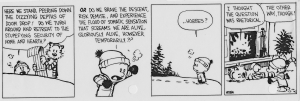When rumors of a new SAT were swirling, the College Board let it leak that they would be doing away with the fill-in-the-blank vocabulary sentences. And they did. The College Board representatives have held press conferences casting aspersions (look it up!) on so-called “SAT vocabulary,” insisting there would be no such vocabulary on the new test. Instead, they’ll be using words that are more common and useful in typical high school and college reading.
The College Board released four sample tests of the new type. In the first test, you’ll encounter the following words. Of course you know them because they’re not honest-to-goodness vocabulary words. Or do you?
Can you define these 29 words (all from Sample Test 1)?
- anecdote (no, not antidote)
- intrude
- deference (nothing to do with deferring)
- ambivalent
- disparagement
- mediation
- imposition
- reciprocate
- celebrated (not the same as celebrating or celebration)
- exclusionary
- unprecedented
- reminisce
- substantiated (not the same as substantial)
- template
- momentous (nothing to do with a moment)
- inquiries
- hypothetical
- feasibility
- depiction
- viability
- refutes
- objectivity
- impartiality
- grave (adjective, not the place you bury someone)
- candor
- solidarity
- conducive
- fanciful (nothing to do with fancy)
- allude
Aren’t you glad they took out vocabulary? Ah, you might be thinking. The College Board said they’d be using words in context. I’ll be able to figure out the meaning from the words and concepts around them. Well, if they ask you if the author’s tone is sardonic or magnanimous, even if you understood the reading, you might not get the right answer because neither of those words would be used in context. At least with the old/current SAT, you could learn a strategy for solving those fill-in-the-blank sentences. With the new test, no such luck.
So don’t throw away your vocabulary books. (By the way, one of the BEST vocabulary books, especially for students who already have a reasonably broad lexicon (again, look it up), is Word Power Made Easy by Norman Lewis. It’s a rather ancient book (I was assigned chapters from it when I was in 7th grade, when phones were still attached to the wall with curly wires!), but year after year, the vocabulary in that book still shows up on SATs. Furthermore, the author’s dry wit makes expanding one’s vocabulary almost fun!
If you plan on taking the new SAT, which will be offered starting in March 2016, it’s more important than ever to read, read, read. You might put a sticky-note inside the front cover to note words that are unfamiliar to you (or even more likely, that are a little familiar to you but you couldn’t define).
Pay particular attention to common words used in an unusual way. (For example, as in the list above, grave normally means a hole in the ground for a dead body, but what does it mean when you say someone gave the student a grave warning?)
And lastly, don’t let your grammar get sloppy. Grammar is now part of the reading section of the SATs. So if you are a stellar reader but think it’s okay to say, “Between you and I, Tom has less girlfriends than Ted,” you’ll ruin your critical reading score. (You caught both errors in that sentence, right?)
If you have any questions or need help, contact me at http://www.wendysegaltutoring.com or at wbsegal@gmail.com or on my Facebook page: https://www.facebook.com/Wendy-Segal-Tutoring-Highschool2college-202183139820161/timeline/
Wendy Segal


